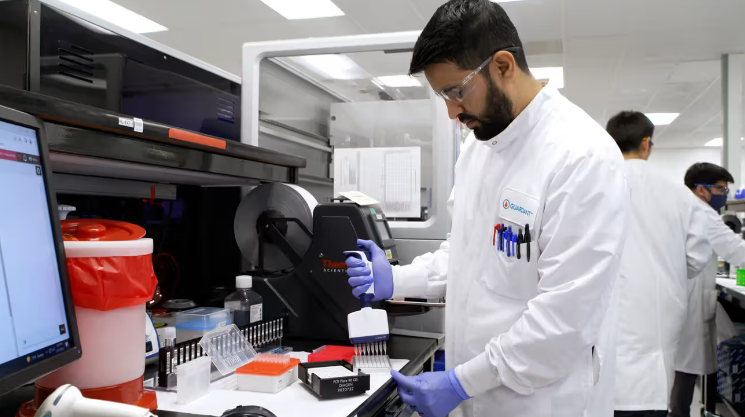A fresh blood test for colorectal malignant growth was endorsed for this present week by the Food and Medication Organization (FDA), making it the main trial of meeting necessities for Federal health care coverage kind.
Guardant Wellbeing’s blood test, called Safeguard, is a harmless blood test that is promoted as a straightforward, helpful option in contrast to different types of colorectal disease (CRC) screening.
Colon malignant growth screening is a famously precarious issue: less than 60% Believed Sourceof grown-ups in the US ages 45 and 75 get evaluating for the illness, in spite of it being the second-driving causeTrusted Wellspring of all disease related passings. However colorectal disease is exceptionally treatableTrusted Source when identified early.
Reluctance around colorectal malignant growth screening might come from the conviction that colonoscopies and stool-based tests are grave or terrible. Notwithstanding, finding a harmless colorectal disease screening test that is both exact and painless has demonstrated testing.
“The determined hole in colorectal disease screening rates shows that the current screening choices don’t speak to a huge number of individuals,” Daniel Chung, MD, a gastroenterologist at Massachusetts General Clinic and teacher of medication at Harvard Clinical School said in a public statement from Guardant Wellbeing.
“The FDA’s endorsement of the Safeguard blood test denotes a colossal jump forward, offering a convincing new answer for close this hole. This choice will assist with making screening tests all the more comprehensively open and drive blood-based testing and CRC screening into another period,” Chung proceeded.
Could a blood at any point test for colon disease supplant a colonoscopy?
Safeguard’s more prominent convenience accompanies a not-immaterial compromise in screening precision.
Clinical experts reached by Healthline said that the potential for missed analyze is unsettling and that the test ought not be seen as a trade for a colonoscopy.
“The greater part of us view at these kinds of tests as assistants or ‘aide’ tests to get more individuals screened and afterward potentially get more colonoscopies in the event that they were positive,” Ben Park, MD, PhD, overseer of the Vanderbilt-Ingram Disease Center at Vanderbilt College, told Healthline. Park was not subsidiary with the Safeguard research however unveiled that he is at present taken part in discrete clinical preliminaries including Guardant Wellbeing.
“The risk of these kinds of tests is assuming they’re negative, they’re not be guaranteed to truly bad,” Park said.
There is a common feeling of excitement among specialists about the potential for Safeguard to get more individuals evaluated for colorectal malignant growth all the more much of the time. Be that as it may, precisely the way in which the test will squeeze into current suggestions is less clear.
“The highest quality level is still a lot of the colonoscopy. Thus, I would be careful guiding patients that we don’t consider this to be an equivalent option in contrast to colonoscopy,” Christopher Chen, MD, an associate teacher of oncology and overseer of the Early Medication Advancement at the Stanford Malignant growth Organization, Stanford Medication, told Healthline.
Uri Ladabaum, MD, overseer of the Gastrointestinal Malignant growth Avoidance Program at Stanford Medication told Healthline, “Guardant Safeguard is supposed to have significant net advantage assuming it stretches out CRC screening to people who are reluctant or incapable to go through screening colonoscopy or stool-based screening.”
Nonetheless, assuming Guardant Wellbeing’s Safeguard were to fill in for screening colonoscopy or stool-based separating those able to utilize them, this is supposed to deteriorate results,” Ladabaum noted.
Blood test recognizes colon malignant growth with 83% exactness
The endorsement of Safeguard shows up on the rear of the Obscuration preliminary, the consequences of which were distributed in the New Britain Diary of Medication in Walk 2024.
The preliminary included almost 8,000 members between the ages of 45 and 84. Safeguard’s known as a sans cell DNA test (cfDNA test)Trusted Source, which searches “free of charge drifting” DNA particles that are shed by disease cells into the circulatory system.
The Shroud preliminary found that in patients with CRC, affirmed by a colonoscopy, Safeguard precisely recognized the malignant growth in 83.1% of cases. That implies a critical number of members with CRC (16.9%) got a misleading negative experimental outcome.
“You may not feel that sounds like a major number, however when you make an interpretation of it into the countless patients who get determined to have colon disease consistently in this nation alone, that is a huge number,” Park said.
“It could seriously gamble with missing a critical number of findings,” Chen noted.
The worry for specialists happens when somebody gets a misleading negative experimental outcome who isn’t consistently getting a colonoscopy too.
“That is where the potential risk is where, you know, we might actually be giving bogus security or feelings of safety,” Park said.
The test additionally doesn’t test for pre-dangerous sores, just distinguishing them in around 13% of cases. It is thusly not viewed as a preventive screen, since it just distinguishes disease that is now present.
Regardless of these provisos, the test addresses another valuable chance to build screening and adherence for a risky, inescapable type of malignant growth. Be that as it may, its actual worth will be found in growing screening as an assistant to colonoscopy, not supplanting it.
The focus point
A blood test for colorectal disease, Guardant Wellbeing’s Safeguard, has quite recently been endorsed by the FDA for Federal medical insurance inclusion, placing the test in reach of a lot more individuals in the U.S. in danger of fostering the illness.
The blood test is a helpful, painless option in contrast to different types of colorectal disease screening that are seen as tedious or undesirable.
Specialists alert that the test ought not be seen as a substitution for the “highest quality level” colonoscopy, but instead an assistant test that can assist with obliging specific patients who could not in any case be screened.
